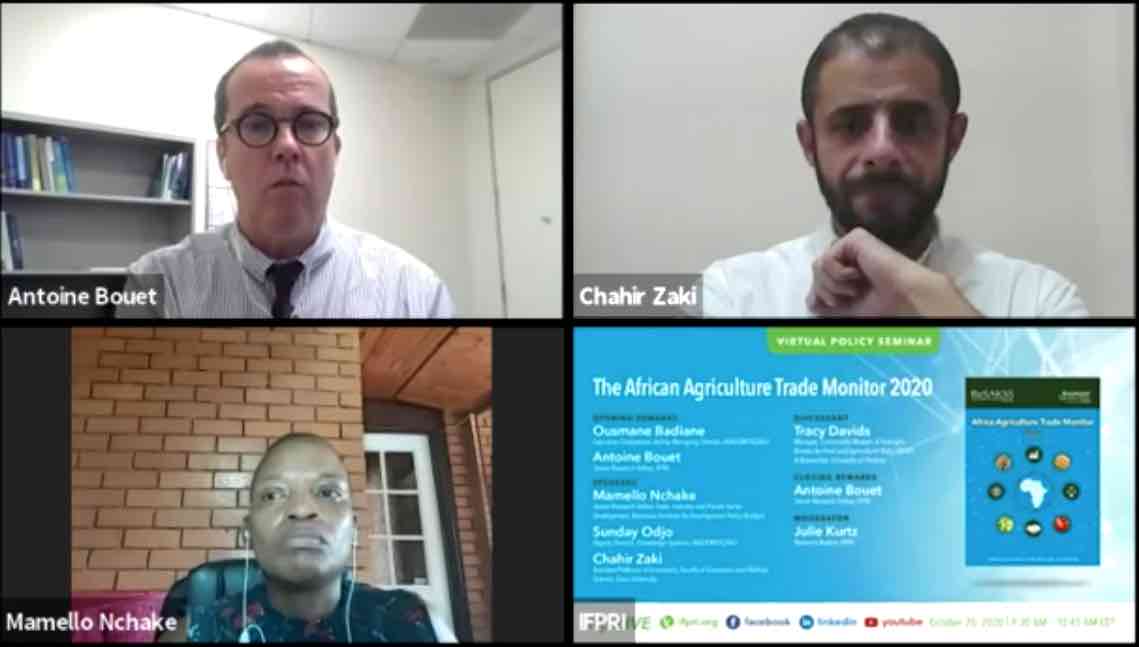As the COVID-19 pandemic disrupts trade flows and relationships worldwide, African governments are rethinking trade polices to respond to the crisis. At the same time, the potential changes induced by the African Continental Free Trade Area have important implications for food security and agricultural development.
An Oct. 22 virtual policy seminar explored these issues and the findings of the third annual Africa Agriculture Trade Monitor (AATM), the leading comprehensive report on agricultural trade flows and policies in Africa, produced by IFPRI and AKADEMIYA2063.
The AATM analyzes the obstacles African countries face in reaching their full potential in international trade, said Ousmane Badiane, AKADEMIYA2063’s Executive Chairperson and Acting Managing Director. One noteworthy trend is the growing role of the processing sector in agricultural trade, he said. The AATM also works to improve the quality of existing trade datasets and constructs more cohesive trade indicators, said IFPRI Senior Research Fellow Antoine Bouët.
Africa’s total agricultural exports have more than doubled over the last two decades, with the top destination of these exports being the European Union, said Sunday Odjo, AKADEMIYA2063 Deputy Director of Knowledge Systems. Africa’s overall agricultural trade deficit has been declining since 2012, yet the deficit in major food value chains has been continuously increasing. According to Odjo, this is largely triggered by countries’ high economic growth, rapid urbanization, and other demographic pressures—with the most growth occurring for cereals, cassava, vegetable oils, and sugar. African countries should explore new trade partnerships on the continent, he said, and reach beyond their surrounding regions. “There is room for expanding intra-African trade by further opening countries to extra-regional trade flows,” he said.
Africa’s non-tariff trade measures tend to add more challenges than tariffs do in trading systems, such as narrowing the choice of goods and providing less transparency, said Chahir Zaki, an Assistant Professor of Economics at Cairo University. “In order to improve exports in Africa… different types of non-tariff measures have to be addressed in African countries and also in their trade partners,” Zaki said.
Southern Africa faces a particular set of trade challenges, said Mamello Nchake, a Senior Research Fellow at the Botswana Institute for Development Policy Analysis (BIDPA). These include multiple and unequal tariff regimes across member countries of the Southern African Development Community (SADC), overlapping membership with other trading blocks, weak monetary and fiscal variables, and asymmetrical external shocks and varying challenges in the banking sector. Countries in southern Africa have a comparative advantage in vegetable products, but not animal products, she said, and SADC trade is generally less diversified in terms of products and markets than the rest of the world. “Participation in regional value chains is critical to SADC countries for growth in exports, investment and productivity,” said Nchake.
The AATM does a comprehensive job of contextualizing the impacts of the pandemic on African trade, as “COVID-19 may have highlighted some vulnerabilities in the global trade system,” said Tracy Davids, Manager of Commodity Markets & Foresight at the Bureau for Food and Agricultural Policy (BFAP). COVID-19 has likely changed the way countries now view and approach trade, she said. The AATM’s focus on the often “overlooked” processing sector is important, she said, as countries may need to scale up processing to address the impacts of pandemic-related trade barriers.
Why is African trade growing so rapidly? Odjo attributed this phenomenon to rising food demand resulting from the continent-wide increase in economic growth, household incomes, and urban migration. Even in the absence of migration, rural populations are increasingly adopting urban lifestyles and consumption patterns as well. “All of these are creating more demand that African agriculture should supply,” said Odjo.
In conclusion, panelists emphasized the importance of political will in achieving trade improvements, the massive role that agricultural trading plays in COVID-19 recovery efforts, the need for domestic support to make trade more effective at the multilateral level, and the focus on domestic food demand in driving future inter-regional trade efforts.
Francesca Edralin is an IFPRI Communications Intern.







